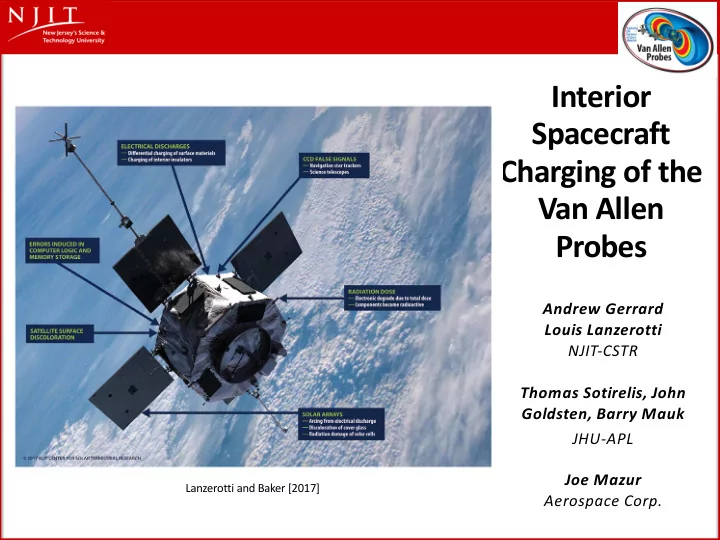

Interior Spacecraft Charging of the Van Allen Probes Andrew Gerrard Louis Lanzerotti NJIT-CSTR Thomas Sotirelis, John Goldsten, Barry Mauk JHU-APL Joe Mazur Lanzerotti and Baker [2017] Aerospace Corp.
Full ERM Data Oct 2012 – Dec 2017 CM1 and CM2, each 38-mm in diameter and under different thicknesses of aluminum (1-mm and 3.8-mm, respectively). CMs detect penetrating electrons of >0.7-MeV and >2.0-MeV, respectively, and protons of >15-MeV and >30-MeV, respectively.
Zoom of Previous Data: Interior Spacecraft Charging of the Van Allen Probes in Relation to Transient Interplanetary Structures CIR-associated CME-associated
First Full Orbit Oct 2012 – Aug 2014 • Persistent “background charging” of ~6- fA/cm 2 • Reduction of charging in the slot region
Full ERM Data Oct 2012 – Dec 2017
Dst as a Nowcast of Charging
Solar Wind Dynamic Pressure as a Predictor of Charging Relative Solar Wind Dynamic Pressure
Synoptics (September 2017 Storm)
Synoptics (September 2017 Storm)
Conclusions • Non-scientific satellites, such as commercial or national defense, normally do not carry instrumentation that provide data on the radiation environmental conditions in which the • spacecraft are flying. • The flight of scientific instrumentation, such as the RBSPICE and REPT instrumentation, can be costly. • This work demonstrates that simple, low cost and low impact charge monitors can provide synoptic space weather measurements and some science results. • Such information can give 1) real time monitoring of the radiation environment around a satellite, and 2) be used for real-time or post facto anomaly analyses. • Considerable consideration should be made to incorporate such monitoring packages on future spacecraft.
Recommend
More recommend